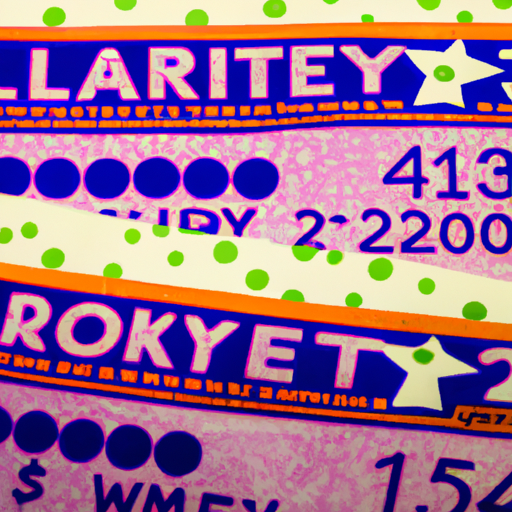Congratulations on winning the lottery! I’m sure you’re beyond thrilled with your newfound wealth and the possibilities it presents. As you bask in the excitement, you may also be wondering about the future of your winnings. Are lottery winnings inheritable? Can you pass on this incredible fortune to your loved ones? In this article, we will explore the fascinating question of whether lottery winnings can be inherited, providing you with clarity and peace of mind as you navigate this extraordinary journey.
What are Lottery Winnings?
Lottery winnings are monetary prizes that are awarded to individuals who have won a lottery game. They can range from a few hundred dollars to multimillion-dollar jackpots, depending on the specific lottery. Winning the lottery is often a life-changing event for the fortunate individual, bringing with it the promise of financial stability and the ability to fulfill lifelong dreams.
Definition of Lottery Winnings
Lottery winnings refer to the money or assets received as a result of winning a lottery game. This can include cash prizes, property, stocks, or other valuable items. These winnings are typically given to the winner by the organization or government entity behind the lottery.
Types of Lottery Winnings
There are various types of lottery winnings that individuals can receive. The most common type is a cash prize, where the winner receives a lump sum of money. Some lotteries also offer annuity payouts, where the winnings are distributed over a specified period in regular installments. In addition, lottery prizes can include non-monetary assets such as cars, homes, or even vacations.
Inheritance Laws and Regulations
Inheritance laws govern the distribution of assets and wealth of a deceased person. These laws vary from country to country and are designed to ensure fairness and clarity in the inheritance process. When it comes to lottery winnings, understanding inheritance laws and regulations is crucial to determine how these winnings will be distributed upon the winner’s death.
Explaining Inheritance Laws
Inheritance laws outline how a person’s estate will be distributed after their death. They establish who has the legal right to inherit the deceased person’s assets, including lottery winnings. These laws often outline a hierarchy of inheritors, such as spouses, children, and other close relatives, and may vary depending on the jurisdiction.
Determining Inheritance Rights
To determine inheritance rights, it is essential to consult the laws of the particular jurisdiction in question. These laws may consider factors like marital status, blood relationships, and whether a will exists. In cases where a deceased person does not have a will or trusts in place, their estate, including lottery winnings, will be subject to intestate succession laws.
Legal Status of Lottery Winnings
Understanding the legal status of lottery winnings is essential to comprehend how they are treated under the law. It is crucial to know who legally owns the winnings and whether they can be transferred to others.
Ownership of Lottery Winnings
Once lottery winnings are awarded, they become the legal property of the individual named as the winner. The winner has the right to possess and use the winnings as they choose. However, it is important to note that the legal ownership of lottery winnings can be subject to certain limitations or conditions, depending on the specific rules and regulations of the lottery.
Transferability of Lottery Winnings
The transferability of lottery winnings varies depending on the jurisdiction and lottery rules. In some cases, lottery winnings can be transferable through legal means, such as assigning the rights to another person or through inheritance. However, certain lotteries may have restrictions on transferring winnings to others, aiming to prevent fraud or misuse of the funds.
Inheritability of Lottery Winnings
Understanding the inheritability of lottery winnings is crucial for individuals who want to ensure that their winnings are passed on to their loved ones after their death.
Understanding Inheritability
Inheritability refers to the ability for lottery winnings to be inherited by another person after the winner’s death. In most cases, lottery winnings are inheritable, meaning they can pass on to the winner’s heirs or beneficiaries. However, the specific conditions for inheritability may depend on inheritance laws, the presence of a will, and other relevant factors.
Factors Affecting Inheritability
Several factors can affect the inheritability of lottery winnings. The existence of a valid will or trust can greatly influence how winnings are distributed. If there is no will or trust, the winnings may be subject to intestate succession laws, which can determine who the legal inheritors are based on blood relationships and marital status. It is essential for lottery winners to be aware of these factors to ensure their winnings are distributed according to their wishes.
Intestate Succession and Lottery Winnings
Intestate succession laws play a significant role in determining how lottery winnings are distributed when a person dies without a will or trust.
Intestate Succession Laws
Intestate succession laws are the legal guidelines that dictate how a person’s assets, including lottery winnings, will be distributed in the absence of a valid will or trust. These laws vary among jurisdictions but generally prioritize close family members such as spouses and children as primary inheritors. If there are no immediate family members, more distant relatives may be entitled to a share of the estate, including lottery winnings.
Applying Intestate Succession to Lottery Winnings
When a lottery winner passes away without a will, intestate succession laws will come into play. These laws determine who the legal heirs are, and the lottery winnings will be distributed accordingly. It is important to note that the specific application of intestate succession laws to lottery winnings may vary depending on the jurisdiction and the rules and regulations governing the particular lottery.
Testamentary Wills and Lottery Winnings
creating a testamentary will is a crucial step for lottery winners who want to ensure that their winnings are distributed according to their wishes after their death.
Importance of a Will
A will is a legal document that outlines a person’s wishes concerning the distribution of their assets after their death. For lottery winners, a will is essential to specify how their winnings should be distributed among their heirs or beneficiaries. It allows them to have control over their assets and ensures that their loved ones are taken care of in the event of their passing.
Including Lottery Winnings in a Will
To include lottery winnings in a will, a lottery winner should clearly state their intentions regarding how their winnings should be distributed. They can specify which individuals or organizations should receive a portion of the winnings, the amount or percentage they should receive, and any conditions or requirements associated with it. It is recommended to consult with an attorney or estate planner to ensure the will is properly drafted and accurately reflects the individual’s wishes.
Estate Taxes on Lottery Winnings
Understanding the implications of estate taxes on lottery winnings is vital for effective estate planning and minimizing tax burdens.
Implications of Estate Taxes
Estate taxes are taxes imposed on the transfer of a deceased person’s estate, including lottery winnings, to their heirs or beneficiaries. The specific tax implications can vary depending on the jurisdiction and the value of the estate. It is important to be aware of these taxes to adequately plan for them and potentially minimize the tax burden on the lottery winnings.
Strategies to Minimize Taxes
There are various strategies that lottery winners can employ to minimize estate taxes on their winnings. One common approach is to establish trusts, which can provide tax advantages and allow for more control over the distribution of assets. Additionally, gifting assets during one’s lifetime or making charitable donations can help reduce the taxable value of the estate. Consulting with a financial professional or tax advisor is recommended to explore these strategies further.
Trusts and Lottery Winnings
Establishing a trust can be a useful tool for managing and distributing lottery winnings both during an individual’s lifetime and after their death.
Creating a Trust
A trust is a legal arrangement created to hold and manage assets, including lottery winnings, for the benefit of designated beneficiaries. By setting up a trust, a lottery winner can specify how their winnings should be managed, who should receive distributions, and under what conditions. This allows for greater control over the winnings and can help ensure that they are distributed in a manner aligned with the individual’s wishes.
Inheriting Lottery Winnings through a Trust
Inheritance of lottery winnings through a trust will depend on the specific provisions outlined in the trust document. The trust can stipulate who the beneficiaries are, the timing and amount of distributions, and any restrictions or conditions associated with the winnings. By using a trust, a lottery winner can provide for their loved ones and designate a trusted individual or institution to manage the assets in the best interest of the beneficiaries.
International Inheritance Laws and Lottery Winnings
International inheritance laws can vary significantly, and understanding them is crucial for individuals who are beneficiaries of lottery winnings from another country.
Variations in Inheritance Laws
Inheritance laws can differ greatly from one country to another. They may have diverse regulations regarding who can inherit assets, the taxation of inheritances, and the recognition of foreign wills or trusts. When dealing with international lottery winnings, it is essential to consult with legal professionals who specialize in international law to navigate the intricate web of regulations and ensure the proper distribution of the winnings.
International Tax Considerations
In addition to inheritance laws, international tax considerations can come into play when dealing with lottery winnings from different countries. Tax regulations may impose reporting requirements or tax liabilities on the transfer or receipt of the winnings. It is crucial to seek advice from knowledgeable tax professionals to understand and comply with the tax obligations associated with international lottery winnings.
Lottery Payout Options and Inheritance
The payout option chosen by the lottery winner can have significant implications for the inheritability of the winnings.
Lump Sum Payouts
A lump sum payout entails receiving the full amount of the lottery winnings in a single payment. Opting for a lump sum payout may have advantages in terms of immediate access to the funds and greater control over how they are managed. However, it is crucial to consider how this choice affects the tax liabilities, distribution, and inheritability of the winnings.
Annuity Payouts
An annuity payout involves receiving the lottery winnings as a series of periodic payments over a specified period, typically spanning many years. Annuities can provide long-term financial security and a stable income stream. When it comes to inheritability, annuities may have certain limitations or conditions that need to be considered, such as whether they can be inherited at all or transferable to another individual.
Effects on Inheritability
The choice between lump sum and annuity payouts can impact the inheritability of lottery winnings. Depending on the specific rules and regulations, the type of payout chosen may affect the ability to transfer the winnings to heirs or beneficiaries. It is essential to carefully review the terms of the lottery and consult with financial professionals to make informed decisions regarding the inheritability of the winnings.
In conclusion, lottery winnings can be inheritable, but the specific conditions and implications vary based on inheritance laws, the presence of a will, the chosen payout option, and other factors. Understanding the legal status, transferability, and inheritability of lottery winnings is crucial for individuals who want to ensure that their loved ones are provided for after their passing. Consulting with legal and financial professionals is highly recommended to navigate the complex landscape of inheritance laws and regulations, as well as to effectively plan for taxes and establish trusts if needed.






